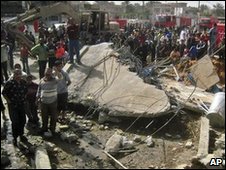 Iraq's second parliamentary election since the 2003 invasion has been hit by multiple attacks, with at least 35 people being killed.
Iraq's second parliamentary election since the 2003 invasion has been hit by multiple attacks, with at least 35 people being killed.
Two buildings were destroyed in Baghdad and dozens of mortars were fired across the capital and elsewhere.
Despite the violence, there were long queues of voters at polling stations in a number of cities.
Polls closed at 1700 (1400 GMT) but people already in line were allowed to cast their votes.
An immense security operation was mounted, involving more than 500,000 Iraqi security personnel.
The border with Iran was closed, thousands of troops were deployed, and vehicles were banned from roads.
Prime Minister Nouri Maliki had called on voters to turn out in large numbers, saying that participation would boost democracy.
“ I am not scared and I am not going to stay put at home ”
Baghdad voter
In Washington US President Barack Obama issued a statement after polls had closed, saying Iraqis had chosen "to shape their future through the political process".
"We mourn the tragic loss of life today, and honour the courage and resilience of the Iraqi people who once again defied threats to advance their democracy," he said.
Multiple attacks
There were mortar, grenade and bomb attacks in Baghdad and in other cities, including Mosul, Falluja, Baquba and Samarra.
But the capital was hardest hit, with dozens of mortar shells falling in several neighbourhoods. Twenty-five people were killed in one explosion that destroyed a residential building in the north of the city.
Despite the attacks, turnout was reported to have been steady in Baghdad and elsewhere.
Queues were also reported at polling stations in Sunni areas of the country, where many people in 2005 decided not to vote.
The election took place against a backdrop of much-reduced violence, with casualty figures among civilians, Iraqi forces and US troops significantly lower than in recent years.
But hundreds of people are still being killed each month, corruption is high and the provision of basic services such as electricity is still sporadic.
Islamic militants had pledged to disrupt the voting process with attacks - a group affiliated to al-Qaeda distributed leaflets in Baghdad warning people not to go to the polls.
'Important choice'
Candidates from 86 factions were vying for 325 parliamentary seats, with some 19 million Iraqis eligible to vote.
Despite Sunday's attacks, Iraq's independent electoral commission said only two of 50,000 polling stations across the country had been closed for short periods due to security concerns.
In Azamiyah (northern Baghdad), Walid Abid, 40, cast his vote to the crumple of mortars exploding not far away.
"I am not scared and I am not going to stay put at home," said the father-of-two.
"Until when? We need to change things. If I stay home and not come to vote, Azamiyah will get worse," Associated Press news agency quoted him as saying.
The previous election, in 2005, saw Mr Maliki become prime minister with Shia Muslim parties dominating the legislature.
President Jalal Talabani was among the first to vote on Sunday in Suleimaniya, and said the election marked both a step, and a test, on Iraq's march to democracy.
In a rare public appearance, radical Shia cleric Muqtada al-Sadr, speaking in neighbouring Iran, urged Iraqis to vote and to reject violence.
Test for democracy?
Iraq's last elections were in February 2009, when voters chose local representatives.
Sunday's elections are being seen as a crucial test for Iraq's national reconciliation process ahead of a planned US military withdrawal in stages.
US President Barack Obama plans to withdraw combat forces by the middle of this year and all US troops are expected to be out of Iraq by the end of 2011.
Correspondents say Prime Minister Maliki looks likely to retain power at the head of his Shia-led coalition.
The key will be whether Mr Maliki can bring Iraq's embittered Sunni minority into his government and make them feel they have a stake in Iraq's political future again.
Expatriate votes cast in Jordan and Syria could play a deciding role in a tight election race, counting for around 10 seats.
There was a reportedly high turnout, with estimates suggesting 800,000 people cast ballots.



